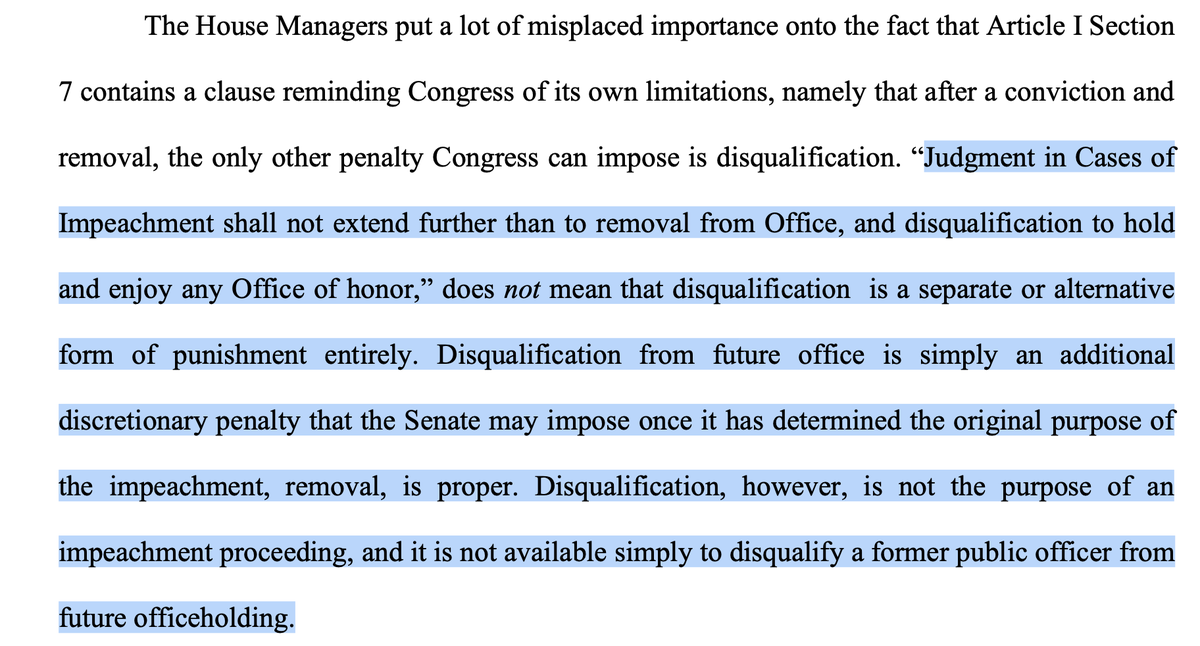(Thread) Trump's Trial Brief
Over the Cliff Notes
This brief, which distorts both the facts and the law, is vintage Trump: a mishmash of bogus defenses and misrepresentations.
The brief is here: https://context-cdn.washingtonpost.com/notes/prod/default/documents/9fc7df1f-2945-4be7-80bc-7e0f928c78b2/note/4430abec-b677-4bfd-9232-d45145aca1cb.#page=1
The brief opens by presenting Trump as a victim
Over the Cliff Notes
This brief, which distorts both the facts and the law, is vintage Trump: a mishmash of bogus defenses and misrepresentations.
The brief is here: https://context-cdn.washingtonpost.com/notes/prod/default/documents/9fc7df1f-2945-4be7-80bc-7e0f928c78b2/note/4430abec-b677-4bfd-9232-d45145aca1cb.#page=1
The brief opens by presenting Trump as a victim

The brief cherrypicks the facts and claims that Trump quickly denounced and urged only a peaceful protest.
The brief concludes that none of it was Trump's fault.
This "conclusion" is reached by selecting a few facts and ignoring everything else.
1/
The brief concludes that none of it was Trump's fault.
This "conclusion" is reached by selecting a few facts and ignoring everything else.
1/
We saw this strategy in the first impeachment: Focus on the single telephone call (in this case, a single speech), ignore all the surrounding facts and circumstances, and conclude that the call (or speech) fails to prove the allegation.
This isn't how facts are analyzed.
2/
This isn't how facts are analyzed.
2/
First, Trump argues that the articles were drafted hurriedly before a thorough investigation could be conducted.
Next, Trump argues that he can't be put on trial after he leaves office.
This creates a "last minute coup" loophole.
3/
Next, Trump argues that he can't be put on trial after he leaves office.
This creates a "last minute coup" loophole.
3/
If impeachment must wait for an investigation (even if the crime is filmed, broadcast on TV and witnessed by the Senate) and if a former president can't be tried by the Senate, lame duck presidents are actually encouraged to stage a last-minute coup.
4/
4/
Because Trump is challenging the facts, the House Managers have no choice but to make a complete presentation of the facts. (This doesn't necessarily mean calling witnesses. Testimonial evidence may not be necessary. There may be enough documented evidence.)
5/
5/
The next defense: Law enforcement knew in advance there would be an attack, so it had nothing to do with Trump's speech.
Notice how many distortions are in the above "defense."
 Just because it was planned in advance doesn't mean Trump didn't encourage the planning.
Just because it was planned in advance doesn't mean Trump didn't encourage the planning.
6/
Notice how many distortions are in the above "defense."
 Just because it was planned in advance doesn't mean Trump didn't encourage the planning.
Just because it was planned in advance doesn't mean Trump didn't encourage the planning.6/
 Trump was head of the executive branch, including federal law enforcement. If there was advance knowledge of an attack, he should have known, which means his speech must be taken in that context. He encouraged people who are planning violence to march to the Capitol.
Trump was head of the executive branch, including federal law enforcement. If there was advance knowledge of an attack, he should have known, which means his speech must be taken in that context. He encouraged people who are planning violence to march to the Capitol. 7/
Typical Trump argument  "Fight" doesn't always mean fight. Even Democrats use the word "fight." So just because Trump told a riled up crowd to walk to the Capitol, and the word "fight" was used, it absolutely does not mean anyone was supposed to really fight.
"Fight" doesn't always mean fight. Even Democrats use the word "fight." So just because Trump told a riled up crowd to walk to the Capitol, and the word "fight" was used, it absolutely does not mean anyone was supposed to really fight.
8/
 "Fight" doesn't always mean fight. Even Democrats use the word "fight." So just because Trump told a riled up crowd to walk to the Capitol, and the word "fight" was used, it absolutely does not mean anyone was supposed to really fight.
"Fight" doesn't always mean fight. Even Democrats use the word "fight." So just because Trump told a riled up crowd to walk to the Capitol, and the word "fight" was used, it absolutely does not mean anyone was supposed to really fight. 8/
Here's the part where he throws his devoted followers under the bus: They were so enamored of Trump that they took it upon themselves to commit crimes, so they deserve what's coming to them and Trump is totally innocent.
9/
9/
More Trump As Victim: Accusing the Democrats of trying to milk a tragedy for political gain.
Now we come to the [totally bogus] legal arguments:
 Congress has no jurisdiction over a former president
Congress has no jurisdiction over a former president
 A former president cannot be disqualified from running for office
A former president cannot be disqualified from running for office
10/
Now we come to the [totally bogus] legal arguments:
 Congress has no jurisdiction over a former president
Congress has no jurisdiction over a former president A former president cannot be disqualified from running for office
A former president cannot be disqualified from running for office10/
I'll start with those. Trump argues that only a sitting president can be impeached.
Well, Trump WAS president when he was impeached. Here is where the brief confuses "impeachment" with the trial. The Constitution says the Senate shall try ALL impeachments.
11/
Well, Trump WAS president when he was impeached. Here is where the brief confuses "impeachment" with the trial. The Constitution says the Senate shall try ALL impeachments.
11/
Again the brief confuses impeachment (happened while Trump was president) with the trial.
The final days of a presidency pose a special danger to democracy and transfer of power.
No way did the drafter carve this time out as an exception to accountability.
12/
The final days of a presidency pose a special danger to democracy and transfer of power.
No way did the drafter carve this time out as an exception to accountability.
12/
To conclude that the Senate can't try a former president, the brief first ignores the plain language of the Constitution, and then mangles the legal scholarship. Brian Kalt explains how he was misquoted here:
https://twitter.com/ProfBrianKalt/status/1358822179220189184
13/
https://twitter.com/ProfBrianKalt/status/1358822179220189184
13/
Next, they make the [bogus] argument that if a president can no longer be removed, the Senate can't hold a trial because the purpose is removal from office
How do they explain away the plain language of the Constitution (also attached) ?
14/

How do they explain away the plain language of the Constitution (also attached) ?
14/
The brief focuses on the word "and" and argues that "and" means both must occur or neither can occur.
In other words, if you don't remove, you can't prevent someone from running for office. Trump can't be removed, therefore, he can't be prevented from running again. . .
15/
In other words, if you don't remove, you can't prevent someone from running for office. Trump can't be removed, therefore, he can't be prevented from running again. . .
15/
. . . and therefore, a trial is pointless.
What follows is more twisted logic. To give one example: Nixon wasn't impeached after he resigned because the primary objective had been accomplished, therefore, it's not possible to try a president after he leaves office.
16/
What follows is more twisted logic. To give one example: Nixon wasn't impeached after he resigned because the primary objective had been accomplished, therefore, it's not possible to try a president after he leaves office.
16/
The argument that disqualification as a penalty cannot be imposed if the president can't be removed
(As if the framers were totally cool with last minute attempts to overthrow an election and stay in power.)
Q for Republican Senators: Are you okay with that reading?
17/

(As if the framers were totally cool with last minute attempts to overthrow an election and stay in power.)
Q for Republican Senators: Are you okay with that reading?
17/
Here's where Trump says if the Senate says he can't run again, he'll do it anyway because the verdict is not "non-binding," and he'll take his case to Court.
(Courts don't have jurisdiction: the Constitution gives the powers of impeachment and removal solely to Congress)
18/
(Courts don't have jurisdiction: the Constitution gives the powers of impeachment and removal solely to Congress)
18/
Now we come to the claim that the impeachment violates Trump's free speech rights.
The First Amendment protects citizens from the government so arguably has no place in an impeachment proceeding in which a government official is accused of trying to remain in office.
19/
The First Amendment protects citizens from the government so arguably has no place in an impeachment proceeding in which a government official is accused of trying to remain in office.
19/
Moreover, there are things an ordinary citizen can say without fear of prosecution that the president cannot say without warranting removal (Like: "I pledge my highest allegiance to Putin and not the US.")
We come full circle . . .
20/
We come full circle . . .
20/
. . . because there is no First Amendment right to incite imminent violence, as Trump is accused of doing, and as many rioters understood him to be doing.
And, as the brief argued earlier, "Go fight" didn't actually mean "go fight."
21/
And, as the brief argued earlier, "Go fight" didn't actually mean "go fight."
21/
Now we come to my favorite-- the House didn't afford Trump "due process."
This is not a criminal trial, and nothing in the Constitution places any "due process" rights on impeachment. The trial is the place for Trump to defend himself.
22/
This is not a criminal trial, and nothing in the Constitution places any "due process" rights on impeachment. The trial is the place for Trump to defend himself.
22/
Besides, as I pointed out earlier, insisting on a lengthy process for impeachment contradicts the idea that a former president can't be impeached because it carves out an even longer "last-minute coup exception."
23/
23/
Almost done. Almost time for more 
Here they allege that the Article of Impeachment is defective because he's accused of doing lots of bad things.
Nope. Trump is accused of inciting an insurrection, and lots of bad things are included to support that charge.
24/

Here they allege that the Article of Impeachment is defective because he's accused of doing lots of bad things.
Nope. Trump is accused of inciting an insurrection, and lots of bad things are included to support that charge.
24/
Finally, Trump claims that he didn't commit a crime.
Um, yes, he did.
Moreover, we saw this argument in the last impeachment: "high crimes and misdemeanors" must refer to a particular provision of the federal criminal code.
This makes no sense for a few reasons.
25/
Um, yes, he did.
Moreover, we saw this argument in the last impeachment: "high crimes and misdemeanors" must refer to a particular provision of the federal criminal code.
This makes no sense for a few reasons.
25/
To begin with:
 the federal criminal code didn't exist when the Constitution was drafted, and
the federal criminal code didn't exist when the Constitution was drafted, and
 it's hard to argue that inciting an armed attack on Congress doesn't constitute a "crime."
it's hard to argue that inciting an armed attack on Congress doesn't constitute a "crime."
The issue for trial is whether Trump incited that riot.
26/
 the federal criminal code didn't exist when the Constitution was drafted, and
the federal criminal code didn't exist when the Constitution was drafted, and it's hard to argue that inciting an armed attack on Congress doesn't constitute a "crime."
it's hard to argue that inciting an armed attack on Congress doesn't constitute a "crime."The issue for trial is whether Trump incited that riot.
26/
Are you all ready for the trial tomorrow?
We already know all the legal arguments. What we don't know is what evidence the House will present. I assume they're holding some fire and they have some powerful stuff.
27/
We already know all the legal arguments. What we don't know is what evidence the House will present. I assume they're holding some fire and they have some powerful stuff.
27/

 Read on Twitter
Read on Twitter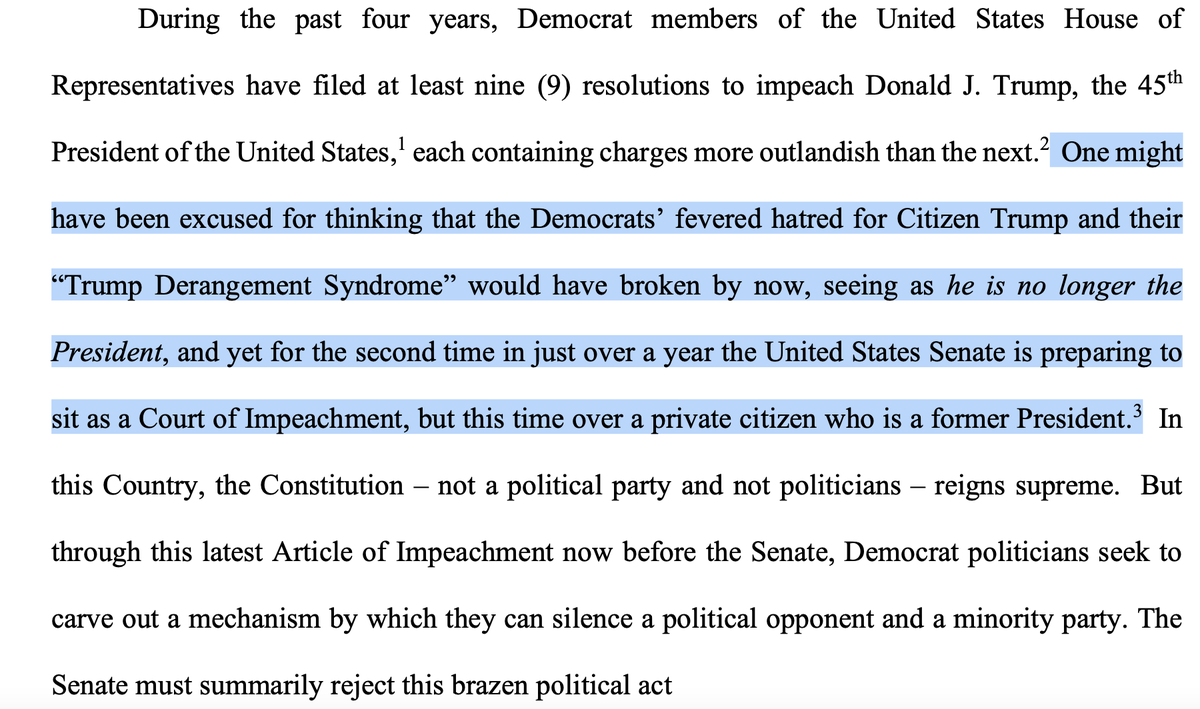

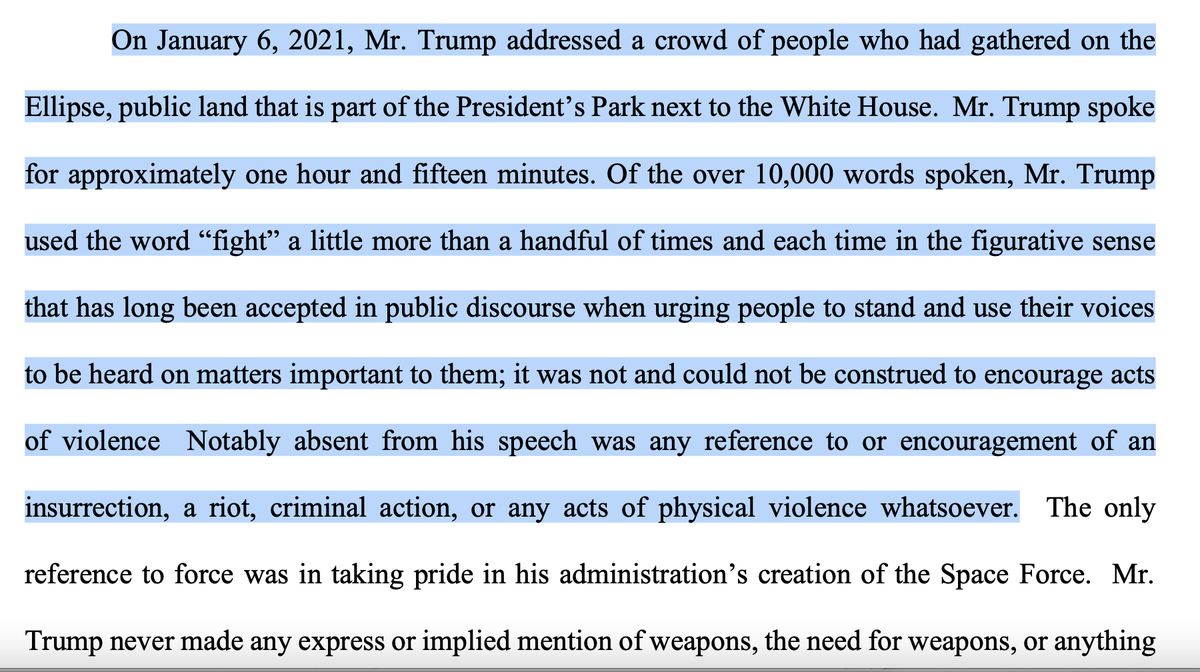
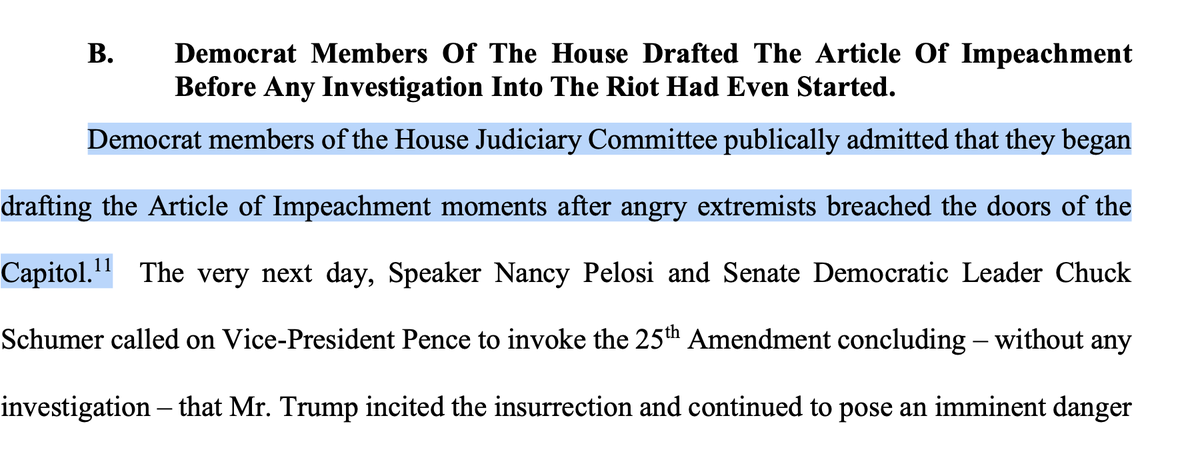





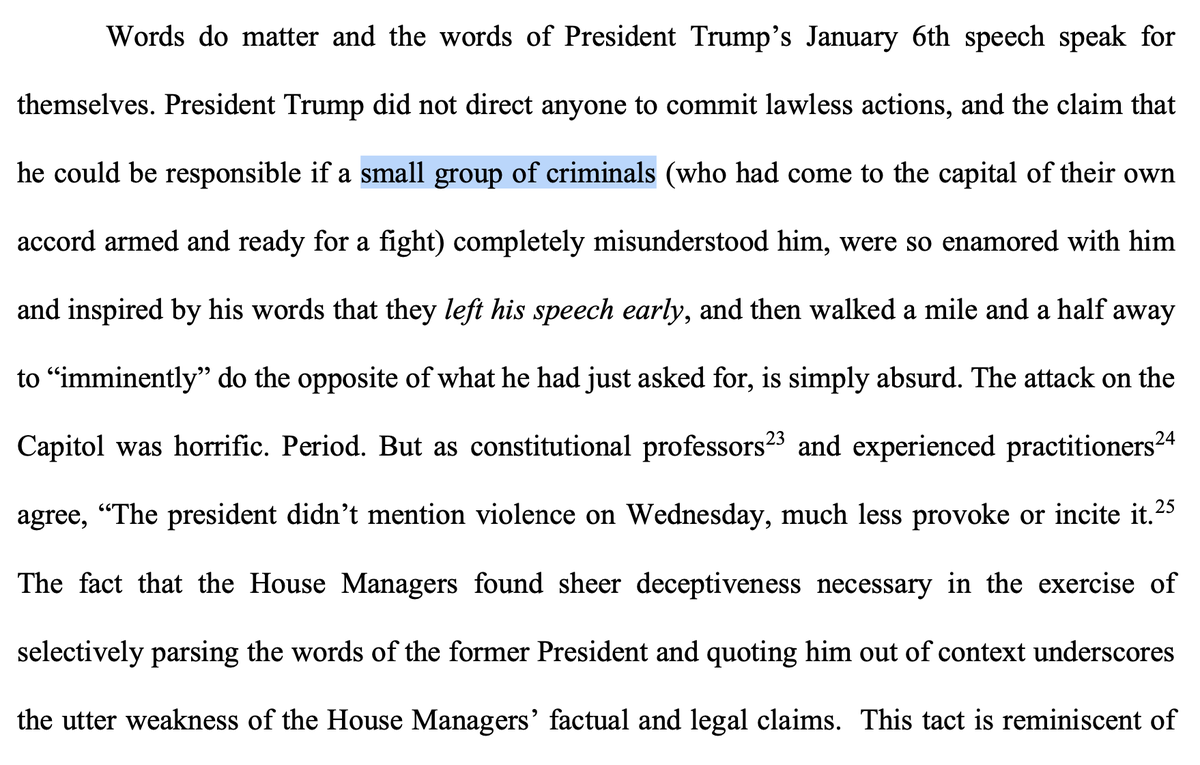
![More Trump As Victim: Accusing the Democrats of trying to milk a tragedy for political gain. Now we come to the [totally bogus] legal arguments:Congress has no jurisdiction over a former presidentA former president cannot be disqualified from running for office10/ More Trump As Victim: Accusing the Democrats of trying to milk a tragedy for political gain. Now we come to the [totally bogus] legal arguments:Congress has no jurisdiction over a former presidentA former president cannot be disqualified from running for office10/](https://pbs.twimg.com/media/EtuNFHvU0AIQ2u8.png)

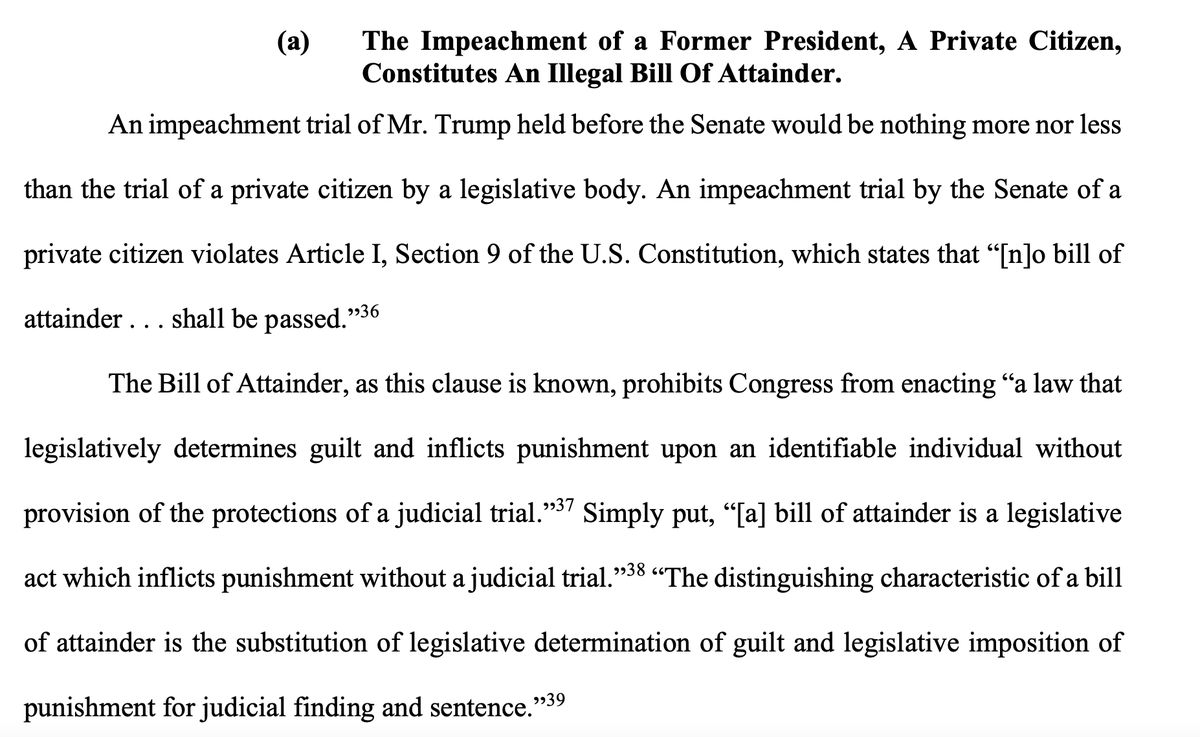
![Next, they make the [bogus] argument that if a president can no longer be removed, the Senate can't hold a trial because the purpose is removal from officeHow do they explain away the plain language of the Constitution (also attached) ?14/ Next, they make the [bogus] argument that if a president can no longer be removed, the Senate can't hold a trial because the purpose is removal from officeHow do they explain away the plain language of the Constitution (also attached) ?14/](https://pbs.twimg.com/media/EtuSAHVUcAE4FAM.png)
![Next, they make the [bogus] argument that if a president can no longer be removed, the Senate can't hold a trial because the purpose is removal from officeHow do they explain away the plain language of the Constitution (also attached) ?14/ Next, they make the [bogus] argument that if a president can no longer be removed, the Senate can't hold a trial because the purpose is removal from officeHow do they explain away the plain language of the Constitution (also attached) ?14/](https://pbs.twimg.com/media/EtuSc0tU0AAgwbH.jpg)


